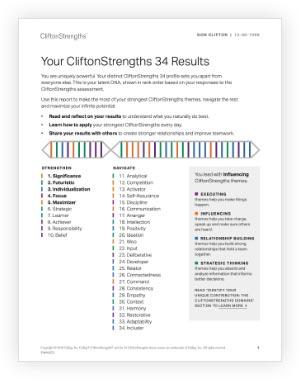Story Highlights
- Inspire greater performance with a focus on what your employees do best
- It's crucial for managers to also focus on their strengths
- Learn steps to build a strengths-based culture that improves performance
Top talent wants to work at a company with a strengths-based culture.
Executive leaders know this.
Building a strengths-based culture is a powerful differentiator that attracts the best -- and when leaders get it right, it inspires performance in employees as each person capitalizes on the best of who they are as they accomplish their work.
In this sort of culture where leaders, managers and employees choose to continuously develop each person's potential, teams report employee engagement scores up to 23% higher, performance increases of 8% to 18%, and 20% to 73% lower attrition.
But what does it take to build a culture like this?
The effort must start with executive leadership and sponsors who agree to prioritize strengths development as part of their organization's core cultural identity.
Executives must begin by first developing their own strengths.
CEOs and executive leaders must engage their vast constituencies to drive company performance.
But we know that only 15% of employees strongly agree the leadership of their organization makes them feel enthusiastic about the future.
This means that nearly nine in 10 employees believe their leadership can do better!
So, leaders need to look in the mirror first to consider where they can raise the bar themselves. When they do this, they develop their own self-awareness by considering how they can leverage the best of who they are to lead effectively.
Building a strengths-based culture is a powerful differentiator that attracts the best -- and when leaders get it right, it also inspires performance in employees.
Beyond considering where they can do better, executives play a critical role in ensuring that strengths development is ingrained in the mission, vision, values and overall culture of the organization.
Make sure managers know their greatest strengths.
As we know, managers account for 70% of the variance in team engagement. We also know that only about one in 10 are naturally gifted at managing others, and that managers are generally 11% less likely to strongly agree that they have the opportunity to do what they do best at work. Furthermore, 36% of managers do not fully believe they have the skills they need to do their best work.
This means that in the same way leaders have room to do better, most managers will also benefit from the investment it takes to build the self-awareness they need -- to develop themselves as they aim to have a positive impact on others and the organization, especially their team members.
In addition to building critical self-awareness about their own management style, knowing their strengths and potential blind spots also enables managers to better understand each associate they are working to develop and engage.
We know that the best managers act like coaches rather than bosses, and that they have ongoing conversations about development and performance outcomes with individual team members all the time.
A strengths-based culture gives the manager and associate a shared language to use as they discuss project successes, barriers and future aims. Remember that even though there are only 34 CliftonStrengths themes, there are more than 4 million variations of just the top five themes alone. When everyone knows their strengths, managers have a language that helps them untangle and put words to the complexities of human nature.
This helps to set both the manager and their team members up for success from the start, providing clearer expectations for the role than what is found in a typical job description.
We know that the best managers act like coaches rather than bosses, and that they have ongoing conversations about development and performance outcomes with individual team members all the time.
A focus on strengths, by the way, doesn't mean that barriers to success are ignored -- in fact, just the opposite. When leveraged effectively, conversations about strengths development can help uncover obstacles so that job crafting, partnerships or personal strengths are enabled to mitigate barriers as individuals grow and develop in their career.
Give all workers the benefit of knowing their strengths.
All employees benefit when they have the opportunity to develop their personal strengths.
With CliftonStrengths, leaders invest in building a culture where every employee can use their voice. Today's workers care deeply about working for an organization that views them as human beings first. This means that they want to work for leaders who emphasize development and with managers who invest in strengths rather than focus on weaknesses.
When employees receive meaningful feedback in ongoing conversations with their manager, they learn how to apply their strengths to their role. They are empowered to do more of what they do best -- a key need for workers today. They begin to work more effectively with their partners and teams when they have a common language to talk about how they can collaborate effectively to reach goals together.
And when employees can agree that their organization is committed to building the strengths of each associate, they are much likelier to believe that their company's mission (and therefore, their job) is important, that their opinions count and that they have the opportunity to do what they do best every day. These all significantly influence engagement outcomes.
When leaders and managers help workers understand and use their strengths, it can directly affect cultural belonging as well. Strengths-based conversations enable employees to express who they are and what talents they bring using a common language.
Those kinds of conversations create a better company culture, the kind that develops its people and attracts top talent. Strengths-based cultures bring out the best performance in every employee and create organic business growth. To achieve that ideal state, executive leaders must start with themselves and then advocate for every employee to have the opportunity to discover their strengths too.
Explore Gallup's thought leadership on achieving your best culture with CliftonStrengths:
- Learn how to create a strengths-based company culture with these five steps.
- Explore learning resources for leaders and managers and recommended courses for you.
- Transform great potential into greater performance with CliftonStrengths.





